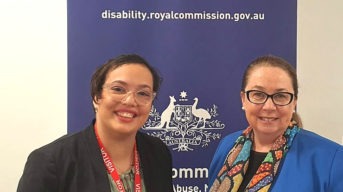
Employment – Disability Royal Commission Final Report
The Disability Royal Commission calls for action on employment of people with disability.

CID staff member Ella Darling told the Royal Commission about the discrimination and exploitation she faced in a number of different workplaces. She spoke about the specific barriers that people with intellectual disability face when trying to find work.
Ella told the Commission how she did not participate in work experience during her school years even though she ‘always wanted to work’. She felt her experiences at school were because ‘they assumed I couldn’t do anything’. Ella also told the commission about things that can be done differently.
What the Commissioners said
The Commissioners said that the opportunity to work in a safe and inclusive environment that pays a fair wage is a core human right. They noted that people with disability face systemic barriers to employment, and that there is lots of work to be done to make sure everyone has equal access to employment opportunities.
The Commissioners identified a number of barriers that stop people with disability from finding and maintaining fair work. These included:
- Attitudinal barriers
- Low expectations of and misconceptions about people with disability
- Discriminatory attitudes, behaviours and ableism
- Complexity of disclosing disability in the workplace
- Physical and environmental barriers
- Physical inaccessibility
- Inaccessibility for people with psychosocial, cognitive and episodic disability
- Lack of support to prepare to enter the workforce
- Pathways from school to work aren’t always helpful
- Applying for jobs
- Inaccessible recruitment processes (no Easy Read or plain English options)
- During employment
- Employers don’t know how to support people with disability
- Employers don’t provide adjustments or flexible work arrangements
- Lack of career progression available
What the Commissioners recommended
The Commissioners made lots of recommendations about how the federal government should improve national disability employment programs and regulations, with an emphasis on open rather than segregated employment.
The Commissioners also made strong recommendations about the role governments have to play in making sure everyone has access to employment. The Commissioners came to the conclusion that the government, at both federal and state levels, should lead the way in making sure employment is accessible by making sure people with disability are employed at high rates in all their departments.
The Commissioners recommended that governments should establish specific targets for disability employment in the public sector, including a specific focus on people with cognitive disability.
The targets are that 7% of new public sector hires should be people with disability by 2025, with this increasing to 9% by 2030.
Some Commissioners specifically commented that targets should include sub-targets for people with intellectual disability, who are less likely to get jobs than other people with disability.
The Commissioners also said that these targets should extend to the organisations that government agencies contract work to.
What CID says
CID welcomes the recommendations from Commissioners that seek to make employment accessible for people with intellectual disability, particularly the focus on federal and state governments.
This is in line with CID’s advocacy in our Everyday for Everyone campaign. In this campaign we advocate for specific targets on public sector employment for people with intellectual disability.
CID has done a lot of advocacy in this space, and we are pleased to see the Commissioners recognising the specific needs of people with intellectual disability in the employment space.



 1800 424 065
1800 424 065 













